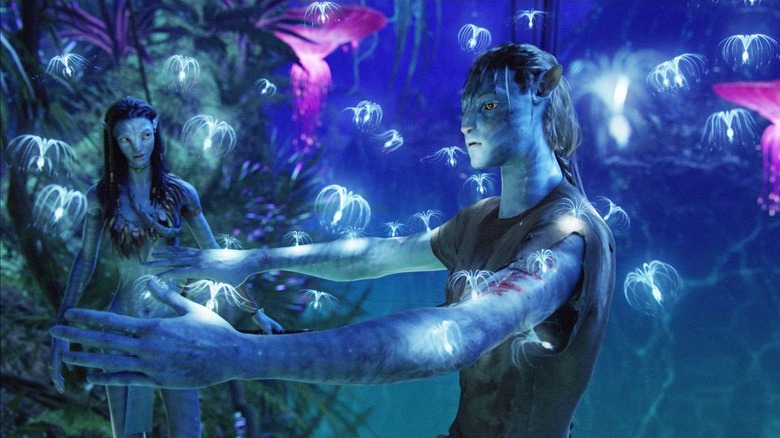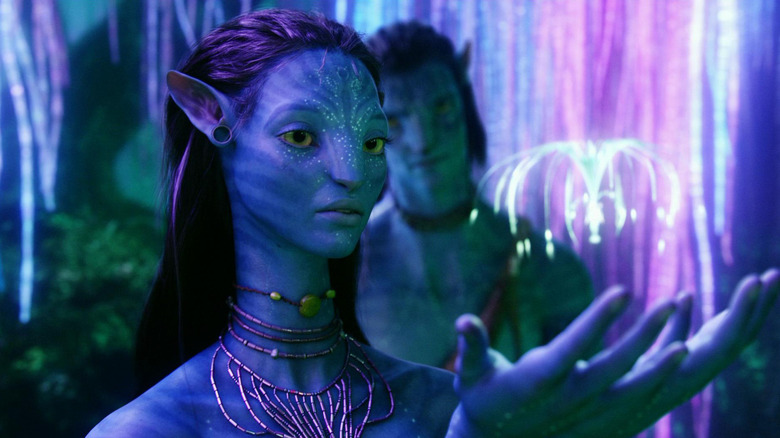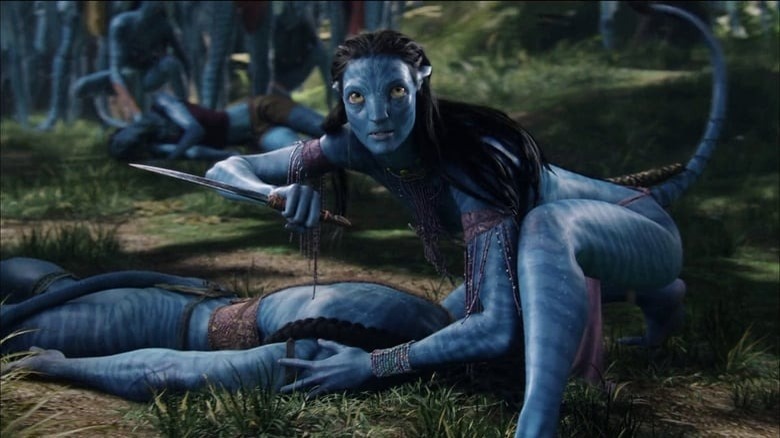A Simple Drawing Saved James Cameron From Almost A Dozen Avatar Lawsuits
The idea for the 2009 film "Avatar" came to James Cameron in a dream. One might be able to intuit its subconscious origins, as the strange, bioluminescent flora and fauna of Pandora, without their sci-fi context, feel very surreal and dreamlike. Cameron, upon waking, found that those bizarre dream images — of alien beings traversing a glowing forest — fit perfectly with his interests in nature, conservation, and super-advanced filmmaking technology. He invented a distant planet where such forests would grow, and incorporated a conceit that would allow human characters to occupy alien bodies. The "Avatar" movies seem to be a pretty clear indicator that Cameron is all too willing to wash his hands of humanity and live on an interplanetary Eden-like world.
Of course, dreaming up his film ideas has gotten Cameron in trouble before. According to the 2009 biography "The Futurist: The Life and Films of James Cameron" by Rebecca Keegan, Cameron was inspired to make his 1984 film "The Terminator" thanks to a dream. The story goes that while he was shooting his first feature, "Piranha II: The Spawning," Cameron came down with a terrible fever. While sick, he dreamt of an evil robot, sans legs, crawling after him with a knife. Cameron incorporated that image into a story about a time-traveling robot assassin. Perhaps coincidentally, however, Cameron's story ended up very, very closely resembling a 1964 episode of "The Outer Limits" called "Soldier" written by Harlan Ellison, also about soldiers traveling from the future. Ellison famously sued Cameron for ripping off his idea, and Cameron settled with Ellison out of court.
With "Avatar," Cameron found that river running the other way. Eager to avoid any lawsuits or creative ambiguity, Cameron would now write down his dreams, leaving hard evidence of when he invented certain images.
'I actually have a drawing'
In an interview with GQ from November of 2022, Cameron talked about how his record-keeping on the ideas for "Avatar" saved him a few headaches. It seems that when you're making one of the most expensive movies in the history of the industry, and it goes on to be one of the most financially successful film of all time, well, many people are going to see it and perhaps recognize similarities to their own creative works. This, Cameron seems to imply, is common in Hollywood. Luckily, as he put it, a simple sketch saved him a lot of grief. In his words"
"I woke up after dreaming of this kind of bioluminescent forest with these trees that look kind of like fiber-optic lamps and this river that was glowing bioluminescent particles and kind of purple moss on the ground that lit up when you walked on it. And these kinds of lizards that didn't look like much until they took off. And then they turned into these rotating fans, kind of like living Frisbees, and they come down and land on something. It was all in the dream. I woke up super excited and I actually drew it. So I actually have a drawing."
As anyone who watched the recent murder mystery "Glass Onion" can attest, having a simple sketch that can be traced to a certain date proves when an idea was conceived and can clear up any legal disputes over intellectual property. Cameron clearly saved his sketch for similar reasons. He said:
"It saved us from about 10 lawsuits. Any successful film, there's always some freak with tinfoil under their wig that thinks you've beamed the idea out of their head. And it turned out there were 10 or 11 of them."
The cases against Cameron
And, yes, Cameron was sued several times for plagiarism over "Avatar," although never successfully. According to a 2013 article in Variety, a man named Eric Ryder was developing a sci-fi movie with an environmentalist bent called "K.R.Z. 2068." Ryder had put together an entire treatment, including photos and 3D graphics to detail his movie. Ryder felt that his film was very similar to what "Avatar" ended up being, and sued Cameron. California courts eventually ruled in Cameron's favor, although Ryder was, at the time, considering an appeal.
This was after a separate case brought against Cameron by a man named Gerald Morawski who claims to have pitched a very "Avatar"-like movie all the way back in 1991. Cameron, however, claims that the germ for "Avatar" predated even that, and the case was thrown out. Prior to the Morawski case, an author named Zhou Shaomou, who wrote the book "The Legend of the Blue Crow," claimed that Cameron was lifting from it, and took the filmmaker to court. A Chinese judge dismissed that case in 2010.
Additionally, a screenwriter named Emil Malak wrote a film in 1997 called "Terra Incognita" which featured a species of peaceful aliens — with long ponytails and actual tails — fighting off an invading force of humans. He pitched the idea to James Cameron's production company in 2002. According to the Vancouver Sun, Malak's case was dismissed over an inability to prove any kind of creative timeline on "Terra Incognita," and that Cameron had actually first written an outline for "Avatar" as early as 1996.
And there are others besides. Cameron seems to have had similar ideas to many floating out in the ether. Keeping that one sketch handy, it seems, saved him a lot of legal trouble.


